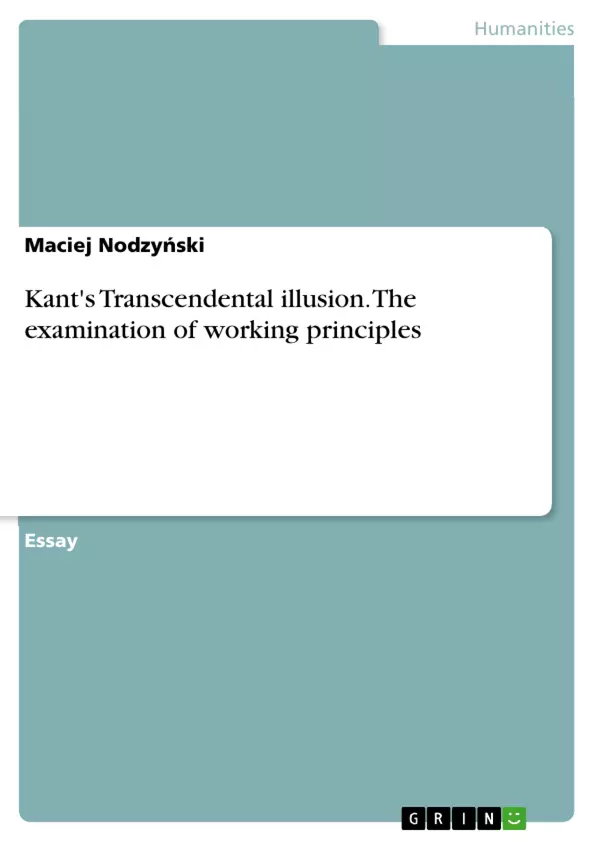We are born and die in the empirical world. We spend our whole lives surrounded by sensible objects, and nothing indicates that our mind should be bothered by things beyond the realm of experience, if they exist at all. However, our mind undertakes precisely this kind of challenge, i.e., it tries to reach the unknown and the unreachable. This poses a question: why would we bother? Why is our mind interested in issues such as things in themselves or God? Why are we trying to attach predicates to them, and, most importantly, why do most of us fall into the trap of thinking that we have a legitimate right to do so? Immanuel Kant identified this phenomenon as the transcendental illusion, which is a tendency to apply concepts beyond their empirical use, even if one is perfectly aware of it.1 Just as the stick submerged in water seems to be curved, applying concepts beyond experience is equally unavoidable, even when one has realised it is an illusion. Even though Kant described in detail the three faculties that later led to empirical cognitions, he did not explicitly state how these faculties, especially the faculties of intuition and understanding, contributed to the rise of transcendental illusion. Consequently, the question this paper aims to answer is: How is transcendental illusion possible?
Inhaltsverzeichnis (Table of Contents)
- Transcendental Illusion
- How is Transcendental Illusion Possible?
- The Experience
- The Possibility of Experience
- Intuition and Understanding
- The Categories
- The Synthetic Unity of Apperception
- The Phenomenon and Mechanism of the Transcendental Illusion
- The Unconditioned
- The Concept of the Non-Sensible
Zielsetzung und Themenschwerpunkte (Objectives and Key Themes)
This paper examines the possibility of transcendental illusion and attempts to provide an explanation for its occurrence. It does so by tracing the origins of the illusion within the framework of Kant’s philosophy, specifically by focusing on the faculties of intuition and understanding and their role in the construction of experience. This is followed by an analysis of the role of reason in contributing to the illusion.
- The role of the faculties of intuition and understanding in the construction of experience.
- The nature and function of the categories in Kant’s philosophy.
- The concept of the synthetic unity of apperception and its importance for experience.
- The role of reason in promoting the transcendental illusion.
- The nature and limits of human knowledge as they relate to transcendental illusion.
Zusammenfassung der Kapitel (Chapter Summaries)
The first section delves into the possibility of experience itself, examining how the faculties of intuition and understanding work together to construct our perception of the world. The role of the categories in this process is outlined, along with the significance of the synthetic unity of apperception. This section establishes the foundation for understanding the mechanisms of transcendental illusion. The second part focuses on the transcendental illusion itself, tracing its origins to the workings of reason and its pursuit of totality in experience. It explores the concept of the non-sensible as a key element in the illusion, suggesting that our attempt to comprehend the unknown through non-sensible predicates leads to this transcendental error.
Schlüsselwörter (Keywords)
This paper focuses on key concepts like transcendental illusion, experience, intuition, understanding, categories, synthetic unity of apperception, reason, unconditioned, and non-sensible. It examines how these concepts intersect and contribute to our understanding of the limits of human knowledge and the potential for errors in our cognitive processes.
Frequently Asked Questions
What is Kant's "Transcendental Illusion"?
It is the mind's unavoidable tendency to apply concepts and categories beyond the limits of possible experience, such as when trying to reason about God or things-in-themselves.
How do intuition and understanding contribute to this illusion?
While they are essential for constructing empirical experience, the illusion arises when the principles used for experience are applied to things that cannot be sensed.
What are the "Categories" in Kant's philosophy?
Categories are the pure concepts of understanding that our mind uses to organize sensory data into meaningful experience.
What is the "Synthetic Unity of Apperception"?
It is the foundational process of the self-consciousness that links all various perceptions into a single, unified experience belonging to one "I".
Why is the transcendental illusion compared to a stick in water?
Just as a stick appears curved in water due to refraction even if we know it is straight, the transcendental illusion remains convincing even after we realize it is a logical error.
- Citar trabajo
- Maciej Nodzyński (Autor), 2023, Kant's Transcendental illusion. The examination of working principles, Múnich, GRIN Verlag, https://www.grin.com/document/1381841



